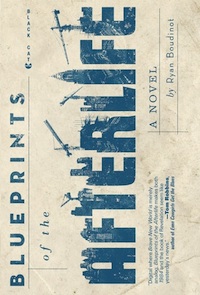It’s probably only recently that a novel as stuffed with genre conceits as Ryan Boudinot’s Blueprints of the Afterlife could be shelved in the literature section. Quantum computers, neurological hacking, time loops, commercialized cloning, all are solidly on the SF side of the fence. But Boudinot’s author background—McSweeney’s, Best American Nonrequired Reading, The Rumpus—and his first novel, Misconception (a coming-of-age story set during the first dot-com boom) swing him back toward the literary world. This combination is what makes Blueprints such a fantastic crossover book. At its heart it is the story of Luke Piper and Nick Fedderly, two brilliant and troubled young men, and how they changed the world—and you couldn’t pull it off without the genre elements.
It’s also the story of champion dishwasher Woo-jin Kan, whose obese sister grows organs in her body for extra cash; Abby Fogg, a young woman who has turned nostalgia into a career as a film archivist; veteran mercenary Al Skinner, estranged from his family and trying to put the ghosts of his past to rest; and Neethan Jordan, a hugely famous actor who can’t stop walking down the red carpet, literally. They live in the world as it exists after the Age of Fucked Up Shit, a world that is simultaneously less different than you might expect and crazier than you could ever imagine. Unless you’re Ryan Boudinot, of course.
Boudinot’s powers of invention are so prolific, in fact, that this could have been a series of novels. Every chapter is stuffed full of zany ideas-turned-reality that I often found myself stopping to think more about, which made the reading both slower and more fun. I’m not the only one; Steve Hely (How I Became a Famous Novelist) agrees in his blurb, saying “Someone should warn him not to give away fantastic ideas at the frantic rate he does. But then again, he might have an infinite supply.” I’ve got my fingers crossed that the supply is infinite, since I look forward to seeing what he does next.
In the meantime, Blueprints has more than enough to be getting on with. Each character gets their turn in the spotlight, and each has a different sort of charm. Woo-jin would really just like for life to be simple, for his sister to stop yelling at him all the time, and maybe also to stop discovering the same dead girl’s body on his way home from work day after day. Skinner would like to come to terms with the many awful things he did, or assumes he did; since he’s wiped his memory of most of it he can only guess. It’s through him that we experience the Age of Fucked Up Shit itself. And Luke, as he is interrogated by an unknown and progressively more hostile person, gives us an unsettling glimpse into our own time, right before everything goes to hell. Not to mention Abby and Neethan, both of whom are essential and shed their own weird light on the storyline as it unfolds.
Classifying Blueprints is tricky. It seems like the words “apocalyptic” and “dystopian” get applied to more and more books, sometimes aptly and sometimes not, and I’ve heard both applied to this novel. But if we’re going by straight definitions (apocalypse being the complete and utter destruction of the known world, and dystopia being a future place in which everything is bad) then neither apply. There’s still a world after the Age of Fucked Up Shit, and enough survives from the previous eras, relatively intact, that it’s hard to make a case for an apocalypse. And while things are certainly pretty bad, there are also moments of good, just like daily life. So while some are calling it post-apocalyptic and/or dystopian, to my mind it has more in common with the works of Neal Stephenson (Snow Crash in particular) and Kurt Vonnegut. Boudinot uses a combination of technology and absurdity to highlight some uncomfortable truths about ourselves and our society, and tells a damn good, seriously action-packed, story as well. It’s a wiggly sort of book, equally at home in fiction and science fiction, with one of the best endings that I can recall reading in some time.
One of the many perks of my job as a bookseller is to watch readers respond to Blueprints. I’ve had customers pitch it to other customers, people they don’t know who happen to be browsing next to them and pick it up for a look at the jacket, which I assure you doesn’t happen every day. In fact, it was a customer’s five-minute-long monologue about how much he enjoyed it that made me pick it up. Dark and funny, depressing and hopeful, absurd and thoughtful, it crosses boundaries like they’re not really there and creates advocates out of readers along the way.
Jenn Northington has been a bookseller since 2005, and is currently the events manager at WORD in Brooklyn. She also writes for Shelf Awareness, is a founding member of the Bookrageous podcast, and aspires to be a big damn hero when she grows up.










